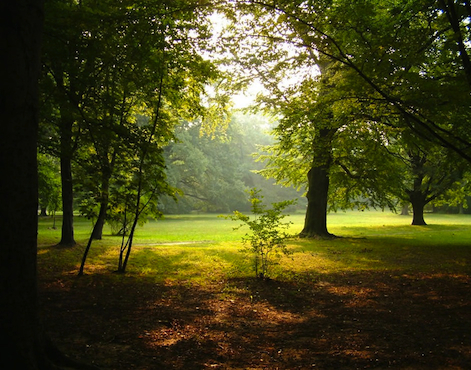 William Cullen Bryant lived from 1794 to 1878.
William Cullen Bryant lived from 1794 to 1878. William Cullen Bryant lived from 1794 to 1878.
William Cullen Bryant lived from 1794 to 1878.
enter this wild wood
And view the haunts of Nature. The calm shade
Shall bring a kindred calm, and the sweet breeze
That makes the green leaves dance, shall waft a balm
To thy sick heart. Thou wilt find nothing here
Of all that pained thee in the haunts of men
And made thee loathe thy life.INSCRIPTION FOR THE ENTRANCE TO A WOOD.
Bryant was a friend of Thomas Cole because Asher B. Durand, a mutual friend, introduced them to one another in the 1820s. Prior to moving from Massachusetts to New York City, Bryant was the son of a physician and was apprenticed to a firm for the study of law in his late teens. Though he practiced law he found the work tedious and soon departed New England for New York City. He wrote poetry in such a manner that Paul Reuben notes,
"Bryant was the first authentic American voice to sing of native birds, such as the brown thrasher and bobolink . . . "
Paul Reuben, Perspectives in American Literature – A Research and Reference Guide. 2011.
As an associate editor of the New York Evening Post from 1826 on, Bryant became a significant influence by advancing Democratic-Republican, and later Free-Soil, then Republican politics supporting radical reform policies in antebellum America. His support for small farmers, businessmen and organizing labor were important but his strongest support was for abolitionism and against slavery, especially after becoming the editor of the paper in the 1830s. In the 1840s he promoted the idea of a preserving and restoring a section of Manhattan in its natural state.
This effort to protect a part of Manhattan as a natural enclave for those less fortunate workers who could not afford to leave the city later became the movement to transform the landscape of what is now Central Park [aerial view shown above].The natural glaciated features for the landscape, for example this rock outcrop, were protected as well as streams, springs and wetlands as evidence for what Manhattan looked like before farms and urban structures altered the landscape and the surface flow of water.
Manhattan Island in the 1880s looking north from Brooklyn.
While Bryant lived there and Whitman there were no bridges off from Manhattan to either shore.
Bryant was a member of the Equal Rights Party a wing of the pro-Jackson and Van Buren Democratic Party that split from the Tammany faction of the party that controlled New York City machine politics through extensive and allegedly corrupt patronage. Favoring free speech and free trade, Bryant toured Europe in 1834-35. In the 1850s struggle over the territory of Kansas' status he favored arming the free soil settlers who were opposed to extending slavery into the territories. Bryant thought John Brown was a hero for his seizure of the militia arsenal in Harper's Ferry, Virginia, just prior to the Civil War.
Stone wall and trees lining the entrance to William Cullen Bryant's home in the northern Berkshires.
William Cullen Bryant's Home, Berkshire Mountains, western Massachusetts.
Bryant was a supporter of John C. Fremont and later Abraham Lincoln in the 1850s when the Republican Party was founded.
![]()
Thanatopsis was written when Bryant was a teenager.
The poem possesses "reflections on themes that had particular significance to early America's citizenry: human mortality, the perception of death as separation, and a disturbing quality due to the transience of life."
The lines
When
1-30; are the opening of a sermon. The doctrines expressed are to establish the writer's authority.
Where
31-73; are the body of the poem (Corpus in Latin) telling who dies and where death is a universality.
How
74-82; are the dénouement (French for closing) lines that admonish us, to sooth and sustain the communion.
link
![]()
Excerpts from Inscription for the Entrance to a Wood,
" . . . The rivulet
Sends forth glad sounds, and tripping o'er its bed
Of pebbly sands, or leaping down the rocks
Seems, with continuous laughter, to rejoice
In its own being. Softly tread the marge,
Lest from her midway perch thou scare the wren
That dips her bill in water. The cool wind,
That stirs the stream in play, shall come to thee,
Like one that loves thee nor will let thee pass
Ungreeted, and shall give its light embrace.
Tags (to use for searching the web) #romanticism, #poetry, #elegy, #nature poetry quotes, #bryant william cullen
Bigelow, John. William Cullen Bryant: American Men of Letters. Cambridge: The Riverside Press, 1890.
Bradley, William Aspenwall. William Cullen Bryant: English Men of Letters. Norwood: Norwood Press, 1905.
Brown, Charles Henry. William Cullen Bryant. New York: Charles Scribner's Sons, 1971.
Godwin, Parke. A Biography of William Cullen Bryant, Volumes 1 & 2. New York: D. Appleton & Company, 1883.